I’ve tested almost every Apple Watch model going back to the original, so I’ve seen its sports tracking abilities evolve and improve quicker than most of the smartwatch competition. If you’re a runner, own an iPhone and want a smartwatch to run with, there are few better options than Apple’s.
I know, because I’ve tested pretty much most of the alternatives from the likes of Garmin, Samsung and others as well.
If I had to pick an Apple Watch I’d trust to track my runs reliably it would be the Watch Ultra or the Ultra 2. I’ve used both for months and months of training, raced on marathon courses renowned for wreaking havoc with GPS like London and Chicago, and the Ultra stood up to the task.
When the Apple Watch Series 10 was revealed, with its bigger screen I anticipated it would match the Ultra for sports features, given it had grown a little closer in size to Apple’s more expensive Watch. That wasn’t the case though.
We didn’t get Ultra-matching battery life or another crucial feature for outdoor runners – dual-band GPS, or Precision Start mode as Apple calls it. This featrure remains Ultra-only, for now at least, and is about improving the accuracy of tracking your movements when you’re outside. Unlike single-band setups, it can communicate to supported satellite positioning systems over multiple frequencies to boost tracking accuracy.
The Series 10 does share some hardware similarities with the Ultra 2, like packing Apple’s latest generation optical heart rate sensor and giving you access to software like advanced running metrics, the ability to build custom workouts and also get a better sense of how tough or light your current training is.
With a spot secured in the 2024 Manchester Half Marathon, thanks to Puma, I thought it was the ideal opportunity to see how the Series 10 fared where data like GPS accuracy really matters.
With the new all-black Watch Watch Ultra 2 on my non-dominant wrist and the 46mm version of the Series 10 on the wrist I usually glance down to keep a check on my progress, I put Apple’s latest to the test to see what it was made of. Here’s how I got on.
Big love for a bigger display
I think it’s fair to say that a big part of the reason the latest Series 10 now comes in its largest display size has something to do with the arrival of the Watch Ultra. I wasn’t wholly convinced about Apple’s decision to go bigger on the display front with the Ultra, especially given I am the owner of pretty slime wrists, but it actually didn’t that long to make the adjustment.
Mike Sawh
if you like the idea of running with an Apple Watch that’s bigger, but just doesn’t feel bigger, that’s what using the Series 10 felt like to me.
The 46mm version is still smaller than the 49mm Ultra 2, but that extra screen real estate means a lot in terms of letting those running stats spread out more. It made glancing down mid-race to check progress noticeably more comfortable than previous non-Ultra Apple Watches.
You do still have more screen on the Ultra 2 and in conditions like this, more screen is definitely better, but the Series 10 has increased that size in a more subtle way that’s still very much in keeping with the feel of previous Series Watches. The Ultra 2 is more dramatic in terms of that size shift and if you like the idea of running with an Apple Watch that’s bigger, but just doesn’t feel bigger, that’s what using the Series 10 felt like to me.
The other big design aspect here is that you don’t get an Action button on the Series 10 like you do on the Ultra. Given that Apple decided to grow the Series 10, I thought it might have considered adding one, but that wasn’t the case.
I know that most runners (including myself) like more buttons, but in this particular scenario, I didn’t miss it too much. I find the Action button mostly useful for pulling up maps from third-party apps that offer integration, or using the backtrack mode when exploring new areas, but during a race, I found I could live without it.
Good data during and post-race
When I’m racing I’m mainly concerned with a few bits of data. One is keeping an eye on my running pace in real-time to ensure I’m sticking to it and will give me a better idea of the kind of time I’m likely to cross that finish line.
It’s also useful to see the average pace alongside it to help make sure I’m on track for my goal. Then there’s of course distance tracking and with all courses placing markers at key distances or even each mile or kilometre, it’s easy to see if your Watch is in line as you run past those markers.
With the Series 10 and the Ultra 2 on my wrist, I could tell early on that the two were closely matched
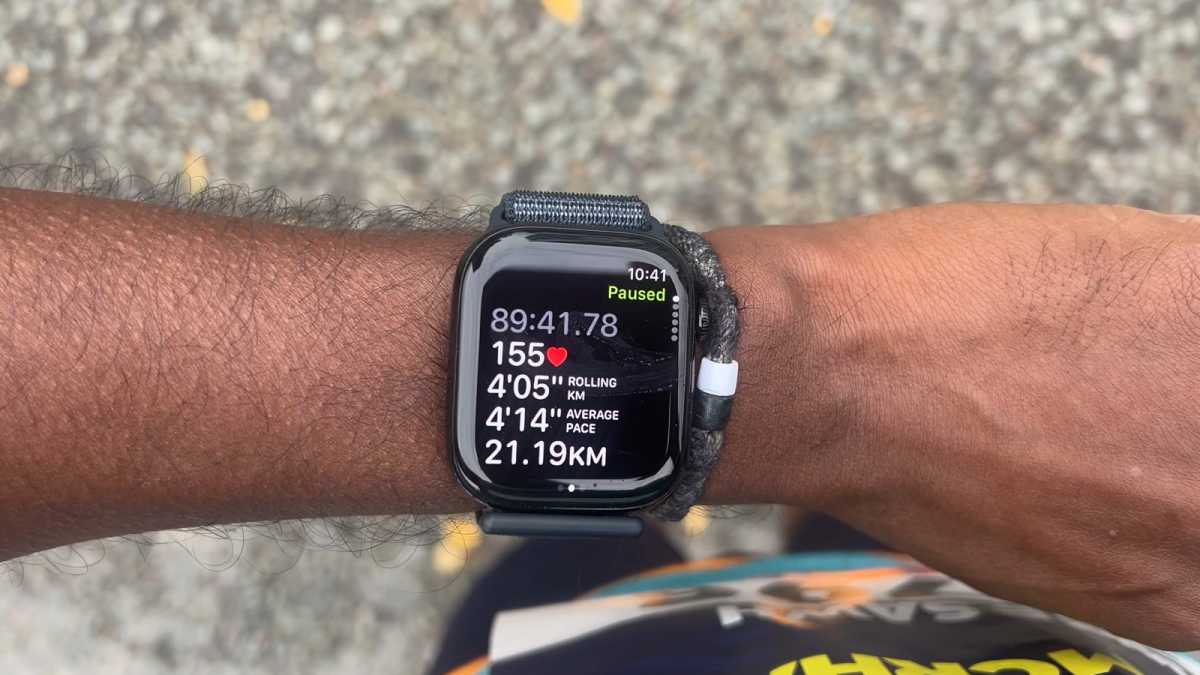
Mike Sawh
With the Series 10 and the Ultra 2 on my wrist, I could tell early on that the two were closely matched up in terms of those stats. When I hit those distance markers, both watches were not far behind it and often matched them.
As I got deeper into the race, I started to see some disparity when the Watches vibrated and told me I’d completed another kilometre of the course. This is where the Watch Ultra 2’s added Precision Start mode seemed to factor in, particularly running around a city with tall buildings that inevitably impacts the GPS tracking accuracy.
About halfway through the race, the Series 10 and Ultra 2 weren’t entirely in sync, but the Series 10 also wasn’t wildly off from the course markers or the Ultra 2. When I hit stop at the finish line, this is what the Series 10 and the Ultra 2 displayed on screen:
Apple Watch Series 10 – Distance: 21.19km (13.2miles) | Average pace: 4.14/km
Apple Watch Ultra 2 – Distance: 21.30km/13.2miles | Average pace: 4.13/km
Both Watches recorded slightly over the 21.1km/13.1-mile distance of the official half marathon distance, but they weren’t off by a concerning amount, with both telling largely the same story.
You typically never run in a straight line in a race as you weave in and out of other runners, so some variance is expected.
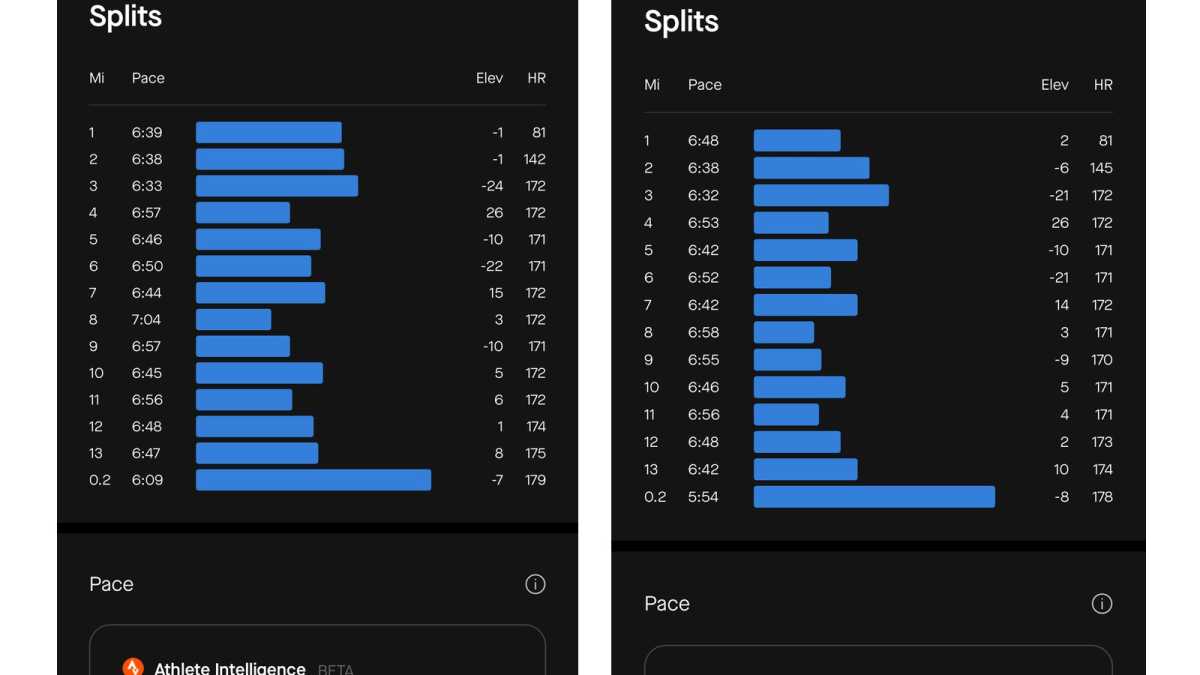
Mike Sawh
The average pace data I typically pay attention to wasn’t that different either. Digging into the pace of different race sections (see above), while they didn’t match up perfectly, they were only a few seconds off. And as you can see, the heart rate figures were nearly identical the entire time.
Delving into the new advanced running metrics which Apple now offers across both Series 10 and the Ultra 2, the data told me a similar story about the run. Metrics like vertical oscillation, which tells you how much you bounce during a run, and the length of my stride were similar on both watches as shown below:
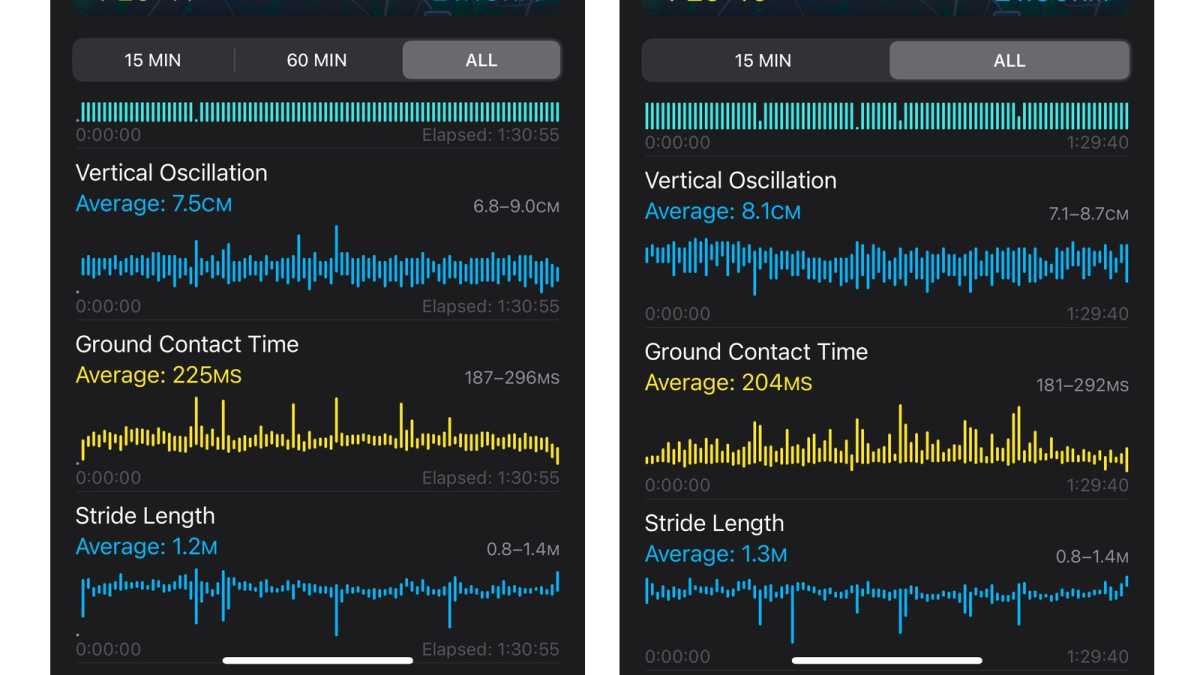
Mike Sawh
For GPS accuracy fiends, pulling the GPS tracks out from each Watch and comparing did show some differences where both Watches had their struggles accurately capturing the route reliably, but that was a bit more of the case with the Series 10 where tracks were slightly wobbly in places, but I was mostly happy with what I saw.
Overall, the Series 10 didn’t feel hugely out of sync with what the Ultra 2 recorded or what my official time stated after the race.
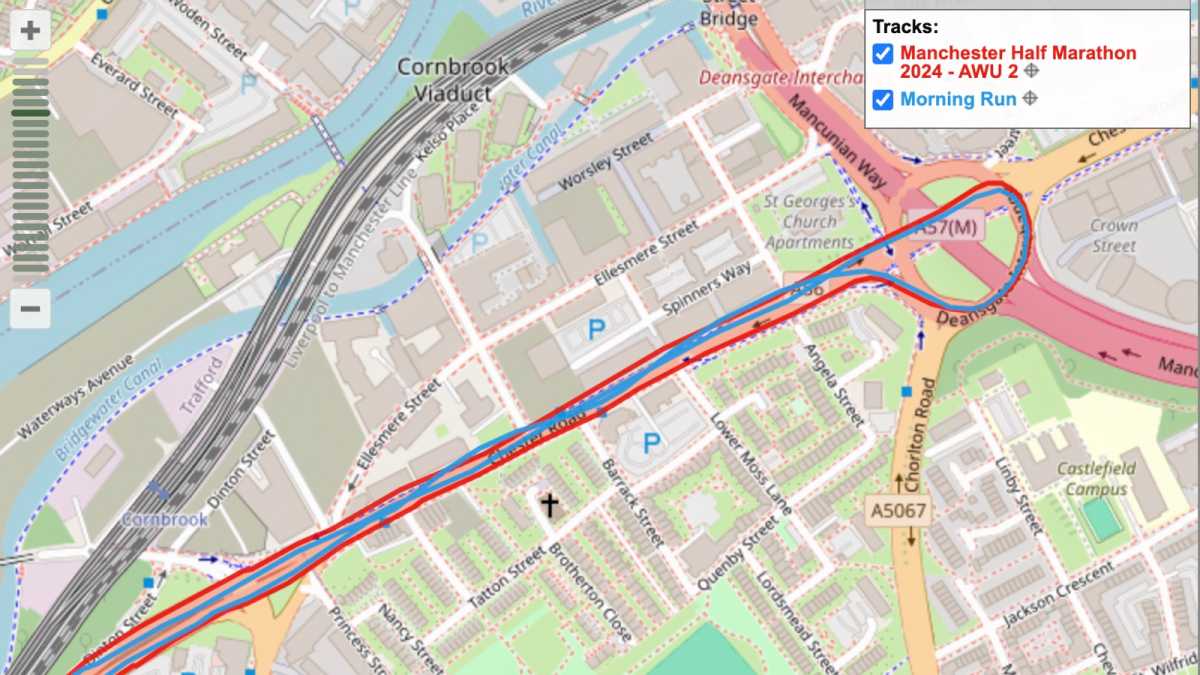
Mike Sawh
Race-fit battery
There was a time when the battery life on the Apple Watch wasn’t fit for running longer distance races. Especially if you had them strapped on all morning leading up to a race as it would suck up juice before you even got moving.
Thankfully, that’s not the case anymore and the Series 10 had no problems making it through a morning of getting ready to run, racing and making it through the rest of the day too.
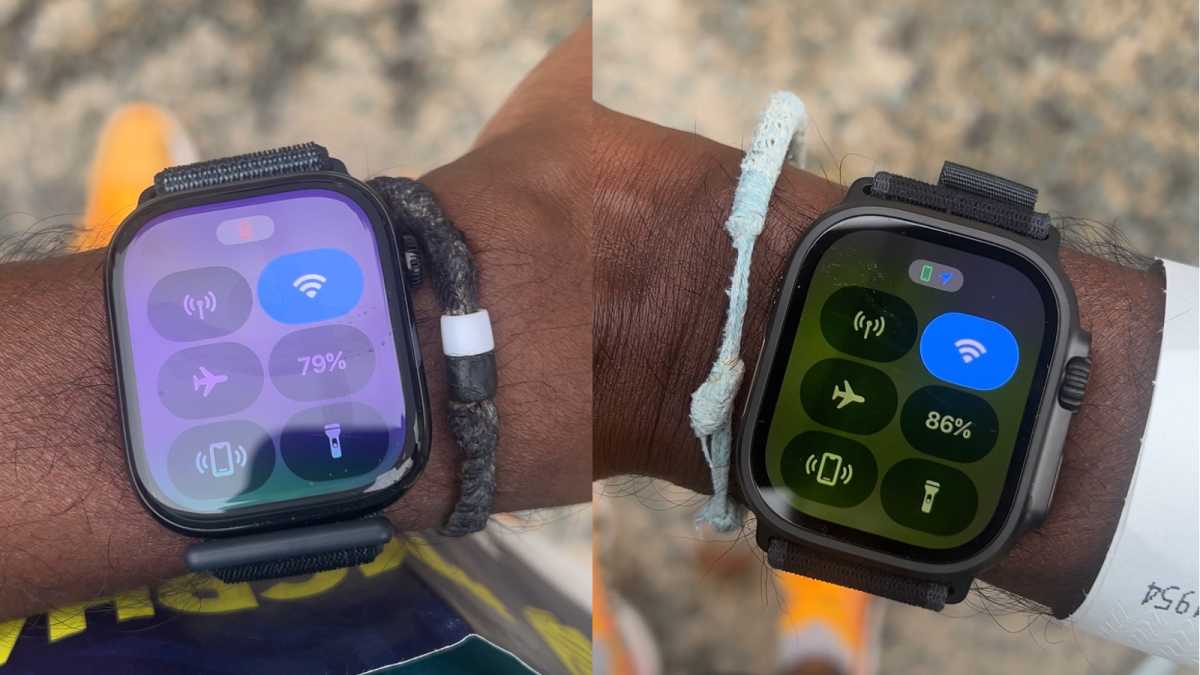
Mike Sawh
the Series 10 had no problems making it through a morning of getting ready to run, racing and making it through the rest of the day too
I decided to fully charge both Watches the night before and then switch them off so I had them at 100% for the entire day. With a 6am start, I switched the watches back on at 7am. By the time I was at the start line, they’d both dropped to 98%.
By the end of the run, the Series 10 dropped to 79% and the Ultra 2 was at 86%. I should add that the Ultra 2 was paired with an external heart rate monitor.
That’s a 19% drop on the Series 10 and 12% on the Ultra 2. Apple suggests a 7-hour GPS battery life for the Series 10 and 12-hour GPS battery life for the Ultra 2.
That Series 10 performance would suggest a slightly lower battery life when you’re putting the GPS to the test. It does seem like it would still have enough to make it through a marathon, though could struggle on a longer one going over 5 hours depending on your pace.
The verdict
So, having strapped on the Apple Watch Series 10 with a little scepticism about whether it was going to match the Apple Watch Ultra 2 for performance, I was actually surprised at how well it did.
I’ve always had a good experience with previous Series instalments, but with the emergence of the Ultra 2, I thought there might have been a bigger gulf between the two. That’s not how things worked out.
run-lovers who want a great smartwatch or are set on Apple Watch don’t necessarily need to spend big on the Ultra 2 to get it
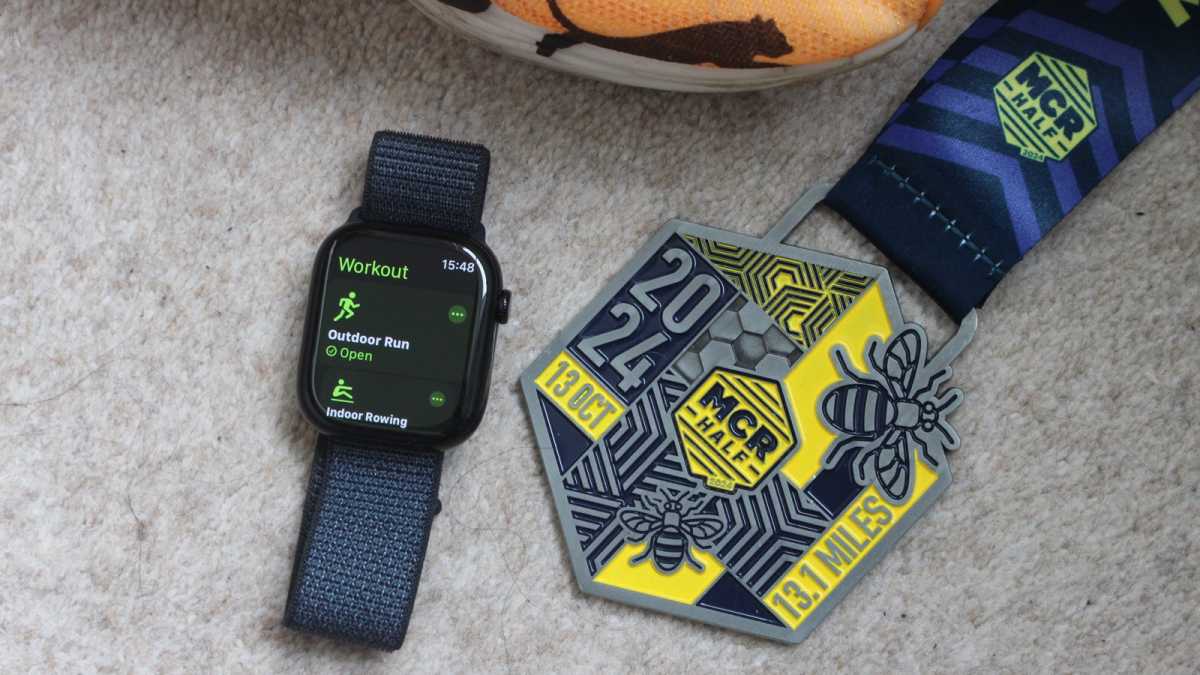
Mike Sawh
I think the integration of a bigger display on the Series 10 makes it a more comfortable, bigger watch for runs and non-running time and I didn’t find like I really missed the Action button either, though I will always take more buttons from a run and workout tracking point of view.
When it came to delivering the data where it mattered, the Series 10 did really well and while it didn’t quite match the Ultra 2 in all departments, crucially, both told similar stories about the race and should be sufficient for most runners.
Given the 46mm Series 10 sits at £429/$429 and the Ultra 2 comes in at £799/$799, I’ve not seen anything significant to say the Series 10 is a massively inferior Apple Watch when it comes to taking it out for runs and racing.
The biggest gains will be that bigger battery life and that upping in GPS accuracy, which will pay off in more challenging tracking conditions, but the Series 10 was a solid performer and proves run-lovers who want a great smartwatch or are set on Apple Watch don’t necessarily need to spend big on the Ultra 2 or wait for the Apple Watch Ultra 3 to get it.

$429
Leave A Comment
You must be logged in to post a comment.